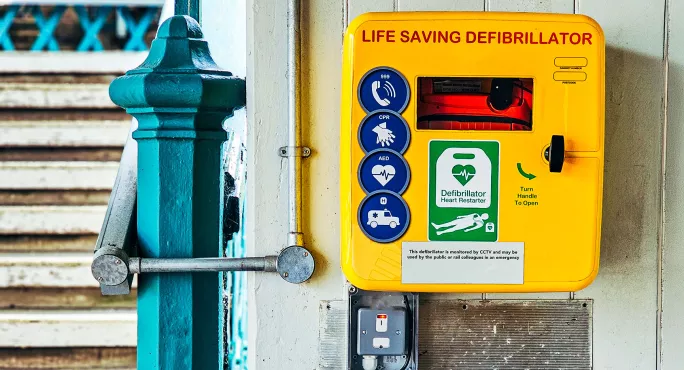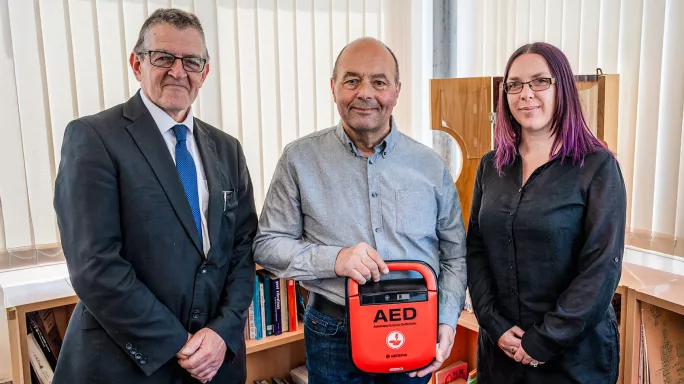When we registered our school defibrillator on the national database back in 2022, we knew it was important, but we didn’t fully appreciate that it could be the difference between life and death.
But in December 2023 we received a call from staff at a nearby pub to say that a man had suffered a cardiac arrest. A bystander had called an ambulance, and the man was being given CPR, but they urgently needed our defibrillator, which was the nearest available.
Within minutes, two of our incredible staff, Year 10 administrator and first aider Sam Keeling-Jones and our site manager Tony Rice, had raced to the pub with our defibrillator and given the man the shock that brought him back to life.
After hospital treatment the man, called Barry, thankfully made a full recovery.
Barry, the man who suffered a cardiac arrest, with Oakwood Park Grammar School’s Tony Rice (left) and Sam Keeling-Jones (right)
I was so proud of my staff for being calm in a crisis but also for having the foresight to register our defibrillator on The Circuit, the national database. This means that in an emergency the ambulance service can locate it.
If that quick and simple five-minute administrative task hadn’t been done, our life-saving defibrillator may not have been used and Barry may not be with us.
Schools registering defibrillators
The British Heart Foundation, which set up The Circuit alongside other health organisations including Resuscitation Council UK, St John Ambulance, 14 UK ambulance services and the Association of Ambulance Chief Executives, reports that there are 30,000 out-of-hospital cardiac arrests the UK every year.
For those who have a cardiac arrest, less than one in 10 survive.
Giving cardiopulmonary resuscitation (CPR) and defibrillation quickly is vital because it gives the best chance of survival.
More on school leadership:
This is why in October 2022 the Department for Education sent defibrillators to more than 17,000 state schools in England. These were schools that had asked for one or couldn’t confirm they already had one.
This means there are now many, many locations with defibrillators in case someone suffers a cardiac arrest nearby. Research in the West Midlands shows that approximately a third of out-of-hospital cardiac arrests occur within 300 metres of a school
But all of these defibrillators need to be registered so that the emergency services know where they are.
Worryingly, research from the British Heart Foundation reveals that more than half of state schools - an estimated 10,000 - do not have their defibrillator registered on The Circuit, so they are effectively invisible to the emergency services.
That’s a huge oversight and something that needs to be improved.
If you want to start the new year with a sense of purpose and do something potentially life-saving, check whether your school has registered its defibrillator - and, if not, get it sorted.
Registering a defibrillator might seem yet another task to do but it takes less than five minutes to log on to thecircuit.uk, and it really could save lives. Our story is proof of that.
Sarah Craig is headteacher at Oakwood Park Grammar School in Maidstone, Kent
For key school and trust leadership insights delivered every month, sign up for the Tes Leaders’ Briefing newsletter






